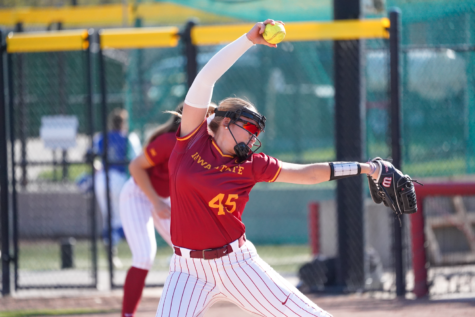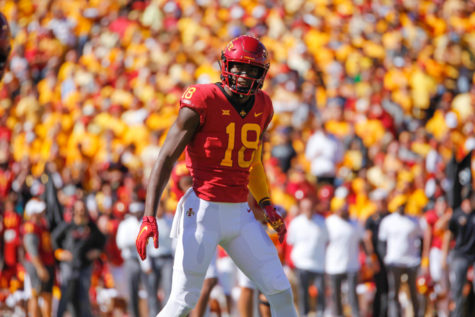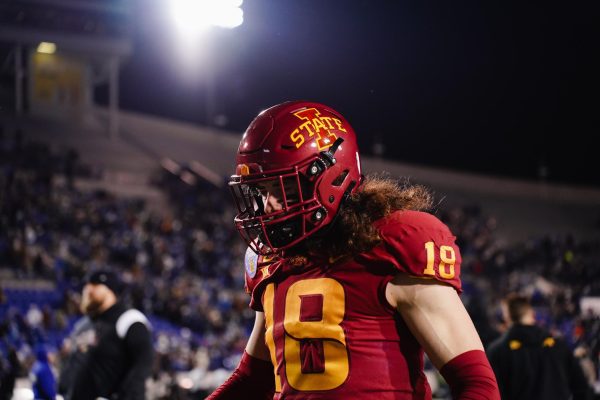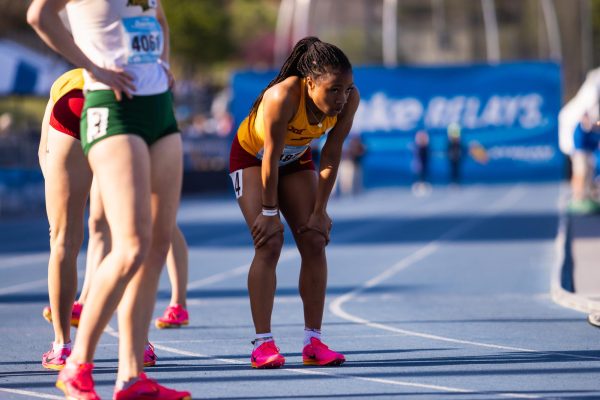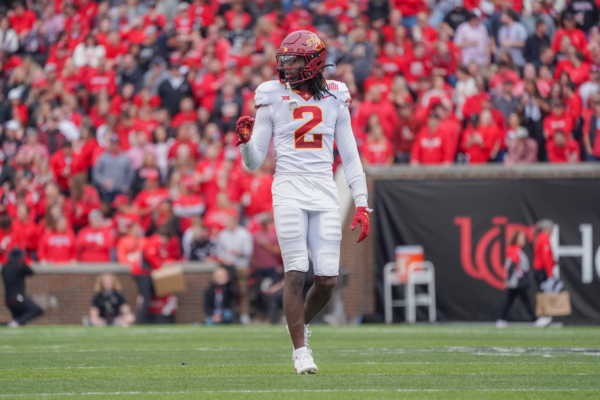Her heart is stronger than the pain
October 16, 2003
It was an accident — an innocent trip on a street curb in West Ames.
It was a fall to the knees, followed by a quick blow to her right elbow. It was quick and it was painful. But the pain of the fall would not compare to the heartbreak to follow when doctors determined the accident would deny Lisa Meshke yet another competitive season with the ISU women’s golf team.
For Meshke, the physical pain of injuries and rehabilitation — accompanied by the mental anguish of being prohibited from competition — are nothing new. In her four seasons at Iowa State, surgery on a chronic back injury has caused Meshke to endure nearly two and a half years of physical and rehabilitative therapy and to forgo the 2002—03 season as a medical redshirt.
Head coach Julie Manning said her staff and her team could not focus on the fact that they were losing one of their best players, but instead thought, “Oh God, it happened again.”
A bright beginning
Lisa Meshke’s golf career started at age 3, when she saw her 6-year-old brother swinging a club and she decided to take up the sport. She finished second three times at the state meet for Blooming Prairie High School in Minnesota and won the Class A title in 2000.
The road to success did not come without a price. In October 2000, only two months into her collegiate career, Meshke started facing muscle spasms and stiffness in her back.
“Those two months were the only two months [of my ISU career] that I was completely healthy,” Meshke said.
A month later, the pain had started to shoot down her legs from the top of her hips to the bottom of her toes.
This pain began what she refers to as “the trail of doctors” — a winding road that would take her through a major back surgery and almost two and a half years of physical therapy and rehabilitation.
After four months of rehabilitation, Meshke made a return to golf for her sophomore season, but at the end of the season, it was apparent to her that her back needed more time to heal.
“I knew I couldn’t go on like that,” Meshke said. “I can’t keep going through this — I can’t play with this pain.”
Meshke took a medical redshirt for the 2002—03 season and said one of the hardest parts of being injured was not being able to practice and travel with her teammates.
“There is a huge void,” she said.
When recalling how she got through the disappointment, Meshke remembered a statement made by her physical therapist Tom Bores of Columbus, Ga.
Meshke said after examining her the first time, Bores told her father that his daughter “must have a really big heart” to still be playing on such a bad back.
Meshke returned this summer with outstanding results. She was able to place in the top 64 at both the US Women’s Amateur and the Women’s Western Amateur tournaments.
Meshke said she got a jump start when she won the Des Moines city tournament, where she shot a 69, her first under-70 score of her career. It was really a “glimpse of brilliance and I thought to myself, ‘Maybe I can do this,'” Meshke said.
Meshke followed that win with her best showing of the summer — a win at the Briarwood Amateur tournament, where she finished in front of six of her ISU teammates and carded a personal record of 67.
“I had waited a long time and dreamed about this moment,” Meshke said.
She said she was happy that all of her teammates were there and she could just focus on playing great golf.
“Why does this keep happening?”
After a year’s absence, it appeared that Meshke was on her way back for a successful season with the Cyclones.
Then the unthinkable happened. After placing in the top 10 in the first two tournaments of the fall season, her accident left her with an injured right elbow and wrist.
When Meshke was unable to completely swing through the ball the next day, she knew her injury was more serious than a simple bruise.
Meshke said she was initially crushed knowing she would have to endure physical therapy and sitting out once again, this time due to an injury that was simply an accident. With her redshirt status used up, Meshke said the hardest part was knowing that she would just “lose” this semester of competition. Meshke said all signs are indicating that she should be able to play when the spring season starts in February.
Manning said Meshke has learned a great deal in the past two years.
“Lisa is very talented and energetic,” Manning said, “[This experience has helped her learn that] her golf score is not who Lisa is.”
“I’ve learned that if you can get through an injury like this and the coping, you can get through anything,” Meshke said.
For now, Meshke said she plans on taking things slowly and focusing on achieving the steps she needs to take to return to competition in the spring.
“You have to always keep your head up and remember you always have something to strive to achieve,” Meshke said,
“I didn’t know that at first … each day is another chance to get better and to achieve the longtime goal.
“I still have a lot of golf to play. Three semesters is a long time to achieve the goals that I want.”










